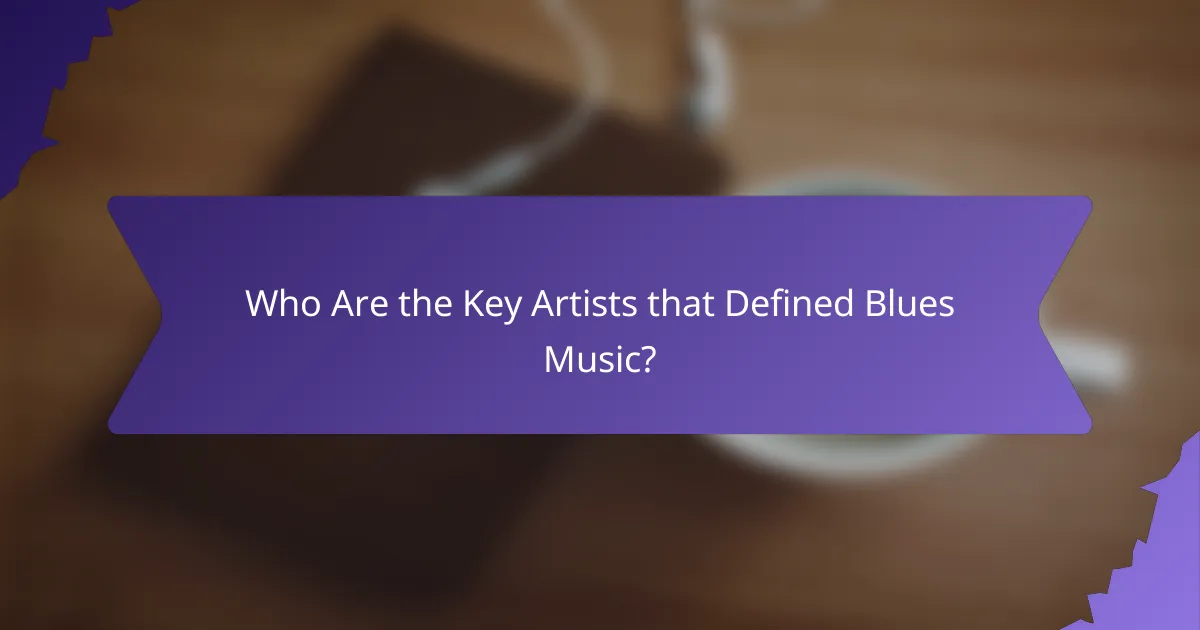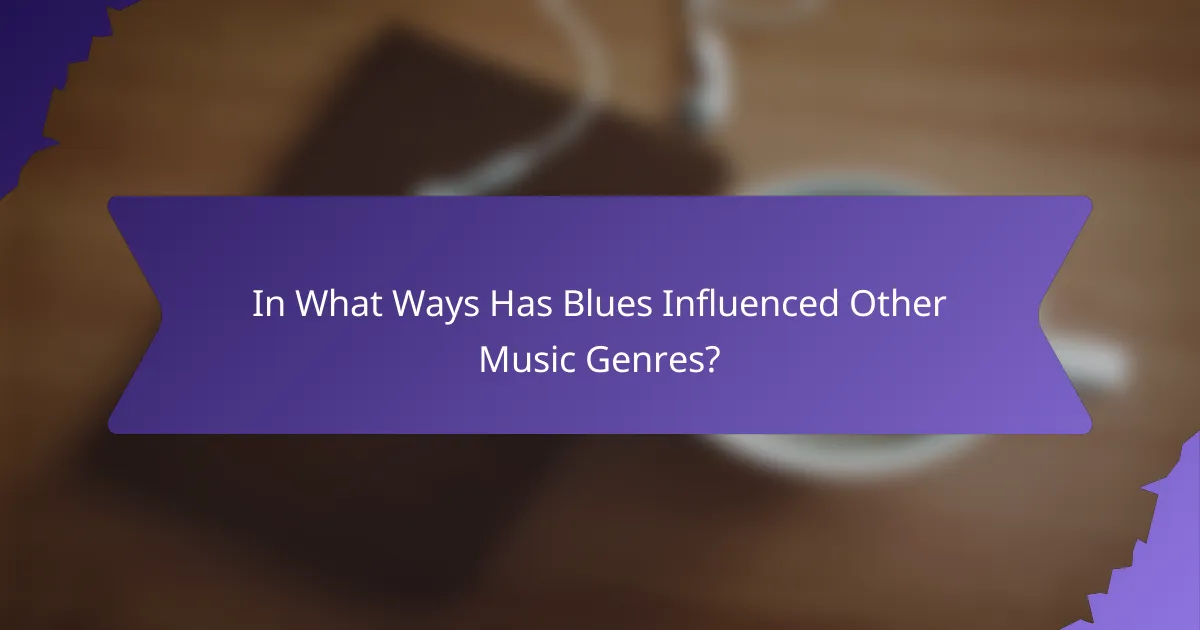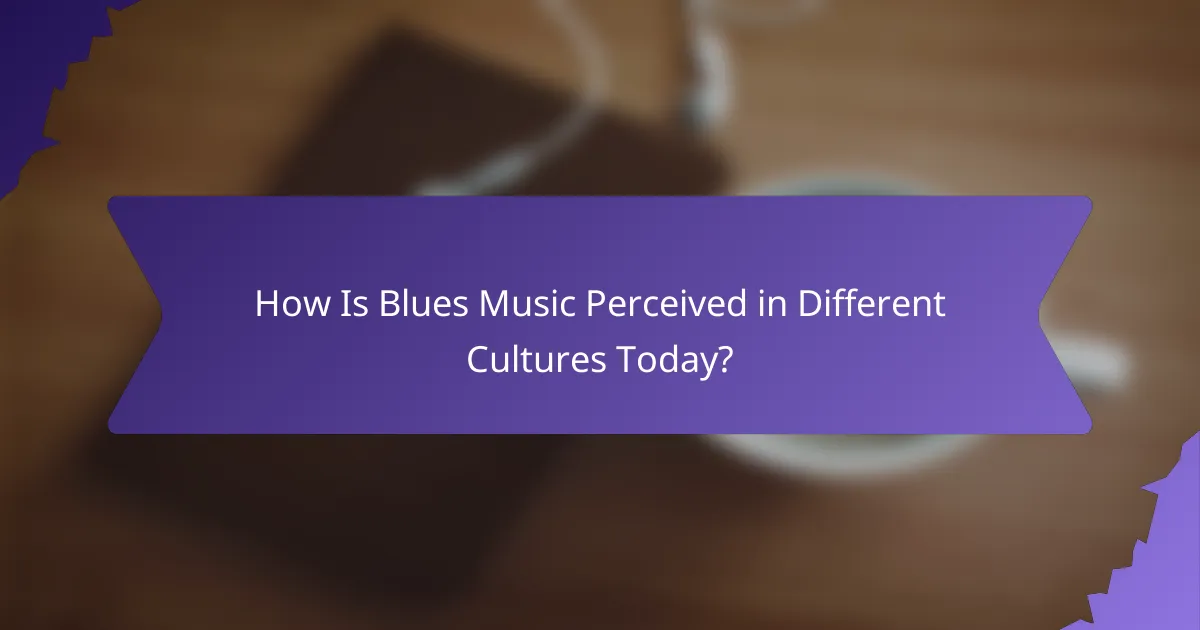The blues is a genre that encapsulates the struggles and emotions of the African American experience. This article explores its historical roots in the Deep South, highlights key artists like B.B. King and Muddy Waters, and examines its profound influence on modern music genres such as rock and jazz. Additionally, it delves into the themes of hardship and resilience that define blues lyrics, showcasing its cultural significance across various societies.

What are the Historical Origins of the Blues?
The blues originated in the Deep South of the United States in the late 19th century. It evolved from African American spirituals, work songs, and folk music, reflecting the struggles and emotions of the African American experience. Key artists like W.C. Handy and B.B. King played significant roles in popularizing the genre. The blues has profoundly influenced modern music, shaping rock, jazz, and rhythm and blues. Its distinctive twelve-bar structure and expressive guitar riffs continue to resonate in contemporary music genres.
How Did African American Culture Influence Blues Music?
African American culture profoundly influenced blues music through its rich history, storytelling traditions, and emotional expression. The blues emerged from African American experiences, particularly in the South, reflecting themes of struggle, resilience, and hope. Key artists like B.B. King and Muddy Waters shaped the genre, blending African rhythms with European musical structures. The blues also laid the groundwork for modern genres, including rock and jazz, showcasing its lasting impact on music today.
What Role Did the Mississippi Delta Play in Shaping the Genre?
The Mississippi Delta was crucial in shaping the blues genre, serving as its birthplace and cultural epicenter. This region fostered a unique blend of African American musical traditions, including spirituals and work songs. The Delta’s socio-economic struggles influenced the themes of blues music, reflecting hardship and resilience. Key artists like Robert Johnson and Muddy Waters emerged from this area, bringing global attention to the genre. The Mississippi Delta’s rich musical landscape continues to inspire modern music, establishing a lasting legacy.
Which Socioeconomic Factors Contributed to the Emergence of Blues?
The emergence of Blues was influenced by socioeconomic factors such as African American migration, poverty, and cultural exchange. The Great Migration saw many African Americans move from rural South to urban North, seeking better opportunities. This shift fostered a blend of musical traditions, leading to the development of Blues. Economic hardship also played a role, as artists expressed their struggles through music. Additionally, the cultural exchange in urban settings allowed for the fusion of various musical styles, further shaping the genre’s evolution.

Who Are the Key Artists that Defined Blues Music?
Key artists that defined blues music include B.B. King, Muddy Waters, Robert Johnson, and Howlin’ Wolf. B.B. King, known for his expressive guitar work, popularized the genre. Muddy Waters brought electric blues to the forefront, influencing rock music. Robert Johnson’s songwriting and guitar skills set a foundation for future musicians. Howlin’ Wolf’s powerful voice and stage presence captivated audiences, establishing him as a blues icon. These artists collectively shaped the sound and evolution of blues, impacting modern music genres significantly.
What Contributions Did B.B. King Make to the Genre?
B.B. King significantly shaped the blues genre through his expressive guitar style and emotional vocal delivery. His unique attribute, the use of vibrato and string bending, set him apart from other artists. King popularized the genre with hits like “The Thrill Is Gone,” influencing countless musicians across various genres. His contributions helped bridge the gap between traditional blues and modern music, solidifying his legacy as a key artist in music history.
How Did Muddy Waters Influence Modern Blues?
Muddy Waters significantly shaped modern blues through his innovative sound and style. His use of electric guitar and amplified sound set a new standard for blues music. Waters blended Delta blues with urban Chicago influences, creating a unique genre that inspired countless artists. His songs, like “Hoochie Coochie Man,” introduced powerful storytelling and emotional depth, influencing rock and roll musicians such as Eric Clapton and The Rolling Stones. Waters’ emphasis on rhythm and improvisation remains a core element in contemporary blues, ensuring his lasting legacy in modern music.
Which Female Artists Have Shaped the Blues Landscape?
Female artists like Bessie Smith, Ma Rainey, and Billie Holiday have profoundly influenced the blues genre. Bessie Smith, known as the “Empress of the Blues,” popularized the style in the 1920s with her powerful voice and emotive performances. Ma Rainey, often called the “Mother of the Blues,” was instrumental in shaping the genre’s early sound and themes. Billie Holiday contributed a unique emotional depth to blues, blending it with jazz elements. Their legacies continue to inspire modern musicians, highlighting the significant role of women in the evolution of blues music.

How Has Blues Music Evolved Over the Decades?
Blues music has evolved significantly over the decades, blending various genres and influencing countless artists. Originating in the African American communities of the Deep South in the late 19th century, its roots lie in spirituals, work songs, and folk music. Key artists like B.B. King and Muddy Waters shaped the genre, introducing electric instruments and new styles. The 1960s saw blues merge with rock, creating a powerful influence on bands like The Rolling Stones and Eric Clapton. Today, blues continues to inspire modern genres, exemplifying its enduring legacy and adaptability.
What Are the Distinct Styles Within the Blues Genre?
The blues genre features distinct styles including Delta, Chicago, and Texas blues. Delta blues, characterized by its acoustic sound and emotional depth, originated in the Mississippi Delta. Chicago blues evolved from Delta blues, incorporating electric instruments and a more urban feel. Texas blues combines elements of both Delta and Chicago styles, often featuring a more upbeat tempo and influences from country music. Each style reflects unique cultural and historical contexts while contributing to the genre’s overall evolution.
How Did the British Invasion Impact Blues Music?
The British Invasion significantly shaped blues music by introducing it to wider audiences and blending it with rock. British bands like The Rolling Stones and The Yardbirds drew inspiration from American blues artists, revitalizing interest in the genre. This cross-pollination led to a resurgence of blues in the U.S. and influenced modern music styles. The unique attribute of this period was the fusion of blues with rock elements, creating a new sound that appealed to youth culture. As a result, many classic blues tracks were reinterpreted and popularized globally, cementing their place in music history.
What Innovations Have Modern Blues Artists Introduced?
Modern blues artists have introduced innovative elements such as electronic instrumentation, diverse genre fusion, and lyrical storytelling. They blend traditional blues with rock, hip-hop, and jazz, creating fresh sounds. Artists like Gary Clark Jr. and Joe Bonamassa exemplify this evolution, incorporating modern production techniques and themes relevant to contemporary audiences. This innovation not only preserves the genre’s essence but also expands its reach and relevance in today’s music landscape.

In What Ways Has Blues Influenced Other Music Genres?
Blues has profoundly influenced various music genres, shaping their development and sound. Its elements, such as the twelve-bar structure and expressive guitar techniques, have been adopted in rock, jazz, and R&B.
Key artists like B.B. King and Muddy Waters introduced emotional depth and improvisation, which became foundational in rock music. The incorporation of blues scales and rhythms has enriched jazz, leading to fusion genres like jazz-blues.
Additionally, blues has laid the groundwork for hip-hop through sampling and storytelling. The genre’s themes of struggle and resilience resonate across music, creating a lasting legacy that continues to inspire modern artists.
How Did Blues Shape Rock and Roll?
Blues significantly shaped rock and roll by introducing emotional depth and musical techniques. The genre’s roots trace back to African American communities in the Deep South, influencing artists across generations. Key figures like B.B. King and Muddy Waters infused rock with their guitar riffs and vocal styles, establishing a foundation for future musicians. The 12-bar blues structure became a staple in rock music, showcasing blues’ lasting impact on modern genres.
What Connections Exist Between Blues and Jazz?
Blues and jazz share deep historical connections, with blues influencing jazz’s development and structure. Both genres emerged from African American communities, reflecting cultural experiences. Key artists like B.B. King and Louis Armstrong blended these styles, introducing improvisation in jazz rooted in blues. The call-and-response pattern in blues also shaped jazz’s melodic lines.
How Has Blues Music Influenced Hip-Hop and R&B?
Blues music has significantly shaped hip-hop and R&B through its emotional depth and rhythmic patterns. The influence is evident in the sampling of blues melodies and the incorporation of storytelling in lyrics. Key artists like B.B. King and Muddy Waters laid the groundwork for modern genres, inspiring musicians to explore themes of struggle and resilience. This connection enriches the musical landscape, blending traditional blues with contemporary sounds.

What Are the Common Themes and Lyrics in Blues Music?
Blues music commonly explores themes of hardship, love, and resilience. Lyrics often reflect personal struggles and emotional experiences, using storytelling to convey deep feelings. Key artists like B.B. King and Muddy Waters have shaped these themes, infusing them with unique attributes that resonate across generations. The influence of blues on modern music is evident in genres such as rock and jazz, which borrow its emotional depth and expressive style.
How Do Personal Struggles Reflect in Blues Lyrics?
Personal struggles are central themes in blues lyrics, reflecting deep emotional experiences. Artists often draw from their hardships, using music as a form of expression and catharsis. This genre’s historical roots are intertwined with the African American experience, where pain and resilience are conveyed through soulful melodies. Notable artists like B.B. King and Muddy Waters exemplify this connection, articulating personal and societal struggles in their songs. Their influence on modern music persists, inspiring countless musicians to explore similar themes of adversity and hope.
What Role Does Storytelling Play in Blues Music?
Storytelling is central to blues music, conveying personal and cultural narratives. It reflects the struggles and triumphs of life, often drawing from the genre’s historical roots in African American experiences. Key artists like B.B. King and Muddy Waters used storytelling to connect emotionally with audiences. This tradition influences modern music, shaping genres like rock and hip-hop, where narrative lyrics remain significant. The unique attribute of blues storytelling is its authenticity, resonating deeply with listeners and preserving cultural heritage.

How Is Blues Music Perceived in Different Cultures Today?
Blues music is perceived as a profound cultural expression across various societies today. In the United States, it is celebrated for its historical significance and emotional depth, often associated with African American heritage. In Europe, blues influences genres like rock and jazz, showcasing its adaptability. In Africa, the roots of blues resonate with traditional music, emphasizing storytelling and communal experiences. In Asia, blues is gaining popularity, blending with local styles to create unique fusions. Overall, blues serves as a bridge between cultures, highlighting shared human experiences and emotions.
What Are the Popular Blues Festivals Around the World?
Some popular blues festivals around the world include the Chicago Blues Festival, New Orleans Jazz & Heritage Festival, and the King Biscuit Blues Festival. These events celebrate the genre’s rich history and showcase key artists. The Chicago Blues Festival, held annually, highlights local talent and international acts. New Orleans Jazz & Heritage Festival features a diverse lineup, blending blues with other music styles. The King Biscuit Blues Festival, located in Helena, Arkansas, is known for its unique atmosphere and historical significance in blues music.
How Does Blues Music Resonate with Audiences in Various Regions?
Blues music resonates with audiences worldwide by expressing deep emotions and cultural stories. Its roots in African American history create a powerful connection across various regions. Key artists like B.B. King and Muddy Waters have influenced global music, making blues a vital part of modern genres like rock and jazz. The unique blend of sorrow and joy in blues lyrics allows listeners to relate personally, fostering a sense of community and shared experience.
What Are the Challenges Facing Blues Music in the Modern Era?
Blues music faces several challenges in the modern era, including declining mainstream visibility and evolving listener preferences. The genre struggles to attract younger audiences, who often gravitate toward more contemporary styles. Additionally, the commercialization of music has led to a dilution of authentic blues sounds, impacting its traditional roots. The rise of digital platforms has created both opportunities and challenges, as artists navigate the complexities of online distribution while maintaining their unique identity. Furthermore, competition from diverse genres complicates the blues’ ability to stand out in a crowded music landscape.
What Best Practices Can Emerging Artists Follow to Succeed in Blues?
Emerging artists can succeed in blues by mastering essential techniques, networking effectively, and understanding the genre’s history. Focus on developing a unique sound, drawing inspiration from key artists like B.B. King and Muddy Waters. Attend live performances to connect with audiences and other musicians. Use social media to share music and engage with fans, fostering a community around your work. Regularly practice and refine your skills to maintain authenticity and creativity.